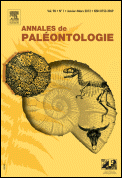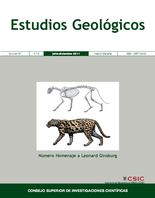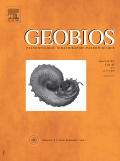
ANNALES DE PALEONTOLOGIE
Scope & Guideline
Pioneering Studies in Earth and Planetary Sciences
Introduction
Aims and Scopes
- Paleobiology and Systematics:
The journal emphasizes the study of ancient organisms, their classifications, and evolutionary relationships, often through detailed taxonomic revisions and descriptions of new species. - Biostratigraphy and Palaeoecology:
Research frequently involves the analysis of fossil distributions and their stratigraphic contexts, contributing to the understanding of ancient ecosystems and environmental changes over geological time. - Palaeobiogeography:
The journal explores the geographical distribution of fossil organisms, providing insights into past biogeographical patterns and the factors influencing them. - Sedimentology and Paleoenvironmental Analysis:
Studies often focus on the sedimentary contexts of fossil finds, interpreting depositional environments and their significance for reconstructing ancient ecological scenarios. - Integrative Approaches:
The journal supports interdisciplinary studies that combine paleontological data with molecular biology, geology, and climate science to provide a holistic view of past biodiversity and environmental conditions.
Trending and Emerging
- Climate Change and Environmental Impact Studies:
There is a growing trend in examining the effects of climate change on past biodiversity and ecosystems, with research increasingly linking fossil data to contemporary environmental issues. - Integrative Phylogenetic Studies:
Emerging studies are focusing on using molecular data alongside traditional morphological analyses to clarify evolutionary relationships, especially in taxa with complex histories. - Regional Studies in Southeast Asia:
Research focusing on Southeast Asia has gained prominence, highlighting its unique paleobiological records and providing insights into the region's historical biodiversity and biogeography. - Functional Morphology and Paleoecology:
An increasing number of papers are exploring the functional aspects of fossil morphology, linking anatomical features to ecological roles in ancient environments. - Taphonomy and Preservation Pathways:
There is an emerging interest in understanding how fossils are preserved and the implications of taphonomic processes for interpreting paleoenvironments.
Declining or Waning
- Paleontological Methodologies:
Traditional paleontological methods, such as simple descriptive studies without integrative analysis, appear to be less common as the field shifts towards more quantitative and interdisciplinary approaches. - Focus on Localized Studies:
Research that concentrates solely on localized or niche fossil findings with limited broader implications has decreased, as there is a growing emphasis on studies that contribute to larger biogeographical and ecological narratives. - Non-Marine Fossil Studies:
Topics related to non-marine fossils, particularly those that do not connect to broader environmental or climatic changes, seem to be less prominent, possibly due to a shift in focus towards marine paleontological contexts.
Similar Journals

PalZ
Bridging the Gap Between Past and Present LifePalZ is a prestigious academic journal in the field of Paleontology, published by Springer Heidelberg in Germany. With a long-standing history that traces back to its converged years from 1914 to 2024, this journal offers invaluable insights into the evolutionary dynamics and ecological relationships of past life forms. Holding a commendable impact factor and ranked in the Q2 category of Paleontology, it consistently showcases high-quality research that resonates within the scientific community, evidenced by its Scopus rank of #38 out of 113 in Earth and Planetary Sciences. PalZ is committed to open access, ensuring that its rich repository of scholarly articles is readily accessible for researchers, professionals, and students alike. By engaging with the journal, readers will encounter cutting-edge studies that are pivotal for advancing our understanding of paleobiology and the historical patterns of biodiversity.

Gondwana Research
Advancing the Frontiers of Geological DiscoveryGondwana Research is a premier academic journal published by Elsevier, specializing in the field of geology, with a robust focus on the geological history and processes of the Gondwana supercontinent. With an impressive impact factor and ranking as Q1 in the 2023 Geology category, it stands as a leading platform for disseminating high-quality research. The journal features articles that advance the understanding of Earth and planetary sciences, making significant contributions to geological education and research. Researchers will find its curated content particularly valuable, as it encompasses a wide array of topics including stratigraphy, paleontology, and tectonics, all relevant to both contemporary and historical geological inquiries. Given its substantial reach and esteemed standing—ranked 5th out of 321 in its field—Gondwana Research plays a crucial role in fostering scientific exchange among global experts. Located in the United States with publication continuity from 1997 to 2024, this journal consistently attracts submissions from leading scientists, ensuring that its readership is kept at the forefront of geological discovery and innovation.

ESTUDIOS GEOLOGICOS-MADRID
Exploring Earth's Mysteries, One Study at a Time.ESTUDIOS GEOLOGICOS-MADRID is a prominent journal in the field of geology, published by the esteemed Consejo Superior de Investigaciones Científicas (CSIC) in Spain. Established in 1976, this Open Access journal has been a vital resource for researchers and professionals since its inception. With an impact factor reflecting its contribution to the Earth and Planetary Sciences community, ESTUDIOS GEOLOGICOS-MADRID currently holds a Q3 category ranking in Geology as of 2023, showcasing its relevance and quality within the discipline. The journal publishes a diverse array of geological studies, ensuring wide-reaching access to significant research findings, thereby promoting collaboration and knowledge sharing. Established as a platform for both foundational research and applied geology, this journal fosters academic growth and contributes to understanding the Earth’s processes. Researchers, professionals, and students are encouraged to explore its extensive archive, which includes publications from 1976 to the present. For more information, visit the journal's editorial office at Editorial CSIC, C/VITRUVIO 8, 28006 MADRID, SPAIN.

GEOBIOS
Unveiling the Secrets of Planetary ScienceGEOBIOS is a prominent academic journal published by Elsevier France-Editions Scientifiques Medicales Elsevier, specializing in the fields of Paleontology, Space and Planetary Science, and Stratigraphy. With a rich publication history dating back to 1966, the journal aims to foster scholarly communication and dissemination of significant research findings among professionals and researchers in earth sciences. Recognized for its impact within the scientific community, GEOBIOS holds a respectable Q2 ranking in several categories, positioning it within the top tiers of scientific journals. Despite its traditional publication format, the journal provides a platform for groundbreaking studies that influence our understanding of both the geological past and future planetary developments. The journal's consistent ranking, including Rank #36 in Paleontology and Rank #59 in Space and Planetary Science, underscores its relevance and significance in its field. GEOBIOS serves as an essential resource for those engaged in the exploration of earth's history and its extraterrestrial counterparts, making it invaluable to researchers, students, and professionals alike.

JOURNAL OF THE PALAEONTOLOGICAL SOCIETY OF INDIA
Exploring Evolutionary Insights from the Indian SubcontinentThe JOURNAL OF THE PALAEONTOLOGICAL SOCIETY OF INDIA, published by SAGE PUBLICATIONS INDIA PVT LTD, stands as a significant resource in the field of paleontology, dedicated to disseminating high-quality research and findings from the Indian subcontinent and globally. With an ISSN of 0552-9360, this journal has established itself within the academic community, particularly as it converges its publication years from 2011 to 2024. Ranking in the Q4 category of paleontology as of 2023, it serves an essential niche for researchers and students interested in the historical biological records and evolutionary processes. Despite its current Scopus ranking of #88 out of 113 in the Earth and Planetary Sciences category, the journal plays a pivotal role in fostering scholarly dialogue and advancing the understanding of paleontological sciences in India and beyond. Researchers are encouraged to contribute to this evolving field and share their findings, solidifying the journal's commitment to highlighting significant paleontological research contributions.

Swiss Journal of Palaeontology
Connecting Past and Present Through FossilsSwiss Journal of Palaeontology, published by SPRINGER INT PUBL AG, stands as a leading platform for innovative research within the field of paleontology, contributing significantly to the understanding of Earth's historical life forms and their evolutionary pathways. With its ISSN 1664-2376 and E-ISSN 1664-2384, this journal has established a strong presence in academic circles, recognized as a Q1 journal in the category of Paleontology for 2023. Moreover, it ranks 20th out of 113 in the Earth and Planetary Sciences, securing an impressive 82nd percentile on Scopus, underscoring its influence and reach in the scientific community. The journal publishes cutting-edge research findings, theoretical advancements, and comprehensive reviews that span the globe, making it an essential resource for researchers, professionals, and students in the paleontological sciences. For those interested in contributing to and learning from the latest discoveries, the Swiss Journal of Palaeontology promises to be an invaluable addition to your academic library.

PALEONTOLOGICAL JOURNAL
Charting the Course of Evolutionary Change.The PALEONTOLOGICAL JOURNAL, published by PLEIADES PUBLISHING INC, is a premier platform for the dissemination of research in the field of paleontology. With an ISSN of 0031-0301 and E-ISSN 1555-6174, this journal serves the academic community by providing insights into fossil studies, evolutionary biology, and the historical narrative of life on Earth. Despite being categorized in the Q3 quartile for 2023 and currently holding a Scopus rank of #84 out of 113 in the Earth and Planetary Sciences- Paleontology category, it remains a valuable resource for researchers and practitioners. The journal's coverage spans from 1990 to 2024, offering a comprehensive historical perspective while also addressing contemporary issues in paleological research. Scholars and students alike benefit from its rigorous peer-reviewed articles and the opportunity to access vital knowledge in the ever-evolving field of paleontology.

BOLLETTINO DELLA SOCIETA PALEONTOLOGICA ITALIANA
Unearthing the Past, Shaping the FutureBOLLETTINO DELLA SOCIETA PALEONTOLOGICA ITALIANA is a prestigious journal dedicated to the field of paleontology, published by the SOCIETA PALEONTOLOGICA ITALIANA. Established in 1979, this journal has played a pivotal role in disseminating significant research findings and scholarly articles that enhance our understanding of Earth's biological history. With a proud history of publication stretching from 1979 to 2024, the journal maintains a strong reputation, currently holding a Q2 ranking in Paleontology, reflecting its influence and caliber within the scientific community. Additionally, it is ranked #49 out of 113 in the Earth and Planetary Sciences category by Scopus, placing it in the 57th percentile of its field. While not an open-access journal, it provides critical insights and findings valuable to researchers, professionals, and students alike, fostering a deeper appreciation for paleontological studies. Located in Modena, Italy, the journal continues to be a key resource for advancing knowledge in paleontology, making it an essential read for anyone committed to this fascinating scientific discipline.

Stratigraphy
Uncovering the Past, One Stratum at a TimeStratigraphy is a distinguished journal dedicated to advancing the field of paleontology and stratigraphic research. Published by MICRO PRESS in the United States, this journal is accessible via its ISSN 1547-139X and E-ISSN 2331-656X, providing an essential platform for researchers, professionals, and students alike. With a robust focus on the intricate relationships between geological time and the fossil record, Stratigraphy aims to disseminate high-quality research that enhances our understanding of Earth’s history. Its ranking within the 2023 Q2 category of paleontology reflects its commitment to scholarly excellence, as noted by a Scopus ranking of #65 out of 113 in the Earth and Planetary Sciences domain, placing it in the 42nd percentile. Although not open access, the journal's valuable contributions from 1988 to 2024 encourage a collaborative dialogue among the scientific community, underscoring the significance of stratigraphic studies in environmental and evolutionary research.

FACIES
Fostering Innovation in the Study of Earth’s Past and PresentFACIES is a prominent academic journal published by Springer, dedicated to advancing knowledge in the fields of Geology, Paleontology, and Stratigraphy. With its rich history since 1979 and an impactful convergence of research efforts extending through 2024, FACIES has established itself as a vital resource for scholars and practitioners. The journal boasts impressive ranking metrics: it is positioned in Q2 within Geology and Stratigraphy, and Q1 in Paleontology, reflecting its high-quality contributions to the academic community. Furthermore, its notable Scopus ranks—#28 in Paleontology, #16 in Stratigraphy, and #91 in Geology—underscore its influence and relevance. Although not an open-access journal, FACIES continues to provide significant findings that inform geological practices and enrich our understanding of past and present Earth systems. It serves as an essential platform for innovative research, making it invaluable for researchers, professionals, and students who seek to impact the fields of Earth sciences.